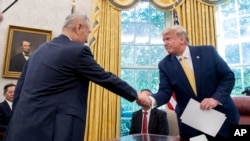A trade deal between the United States and China, separately announced Friday by both countries, will be such a boon for American farmers they will "have to go out and buy much larger tractors," according to President Donald Trump.
The U.S. president, speaking Friday to reporters in the Oval Office, described the agreement with Beijing as a "phenomenal deal."
Officials of the two countries said they had agreed on the text of the first phase of the trade pact and would avert imposing further tariffs on each other.
As part of the agreement, Chinese officials said their country would increase imports of American agricultural, energy and pharmaceutical products.
Trump said agricultural purchases alone would total $50 billion "pretty soon."
More Chinese purchases
Later in the day, a senior U.S. administration official told reporters that the Chinese had committed to increasing "their purchases of manufactured goods, agricultural goods, energy products and services by at least $200 billion over the course of the next two years."
The deal is expected to be signed in the first week of January in Washington between U.S. Trade Representative Robert Lighthizer and Chinese Deputy Premier Liu He, according to officials in Washington.
The text of the agreement includes chapters on intellectual property rights, technology transfer, food and agricultural products, financial services, exchange rate and transparency, increased trade, mutual assessment and dispute settlements, Chinese Vice Commerce Minister Wang Shouwen told reporters in Beijing.
The text was not released. U.S. officials said it eventually would be made public after a legal review and language authentication.
The announcement came two days before $160 billion in new U.S. levies on Chinese products were set to take effect.
"The tariffs will largely remain — 25% on $250 billion — and we'll use them for future negotiations on the Phase Two deal," Trump told reporters.
Those second-round negotiations will commence prior to next November's U.S. presidential election, Trump said.
Officials in Beijing said they also expected Trump to roll back some of the tariffs currently collected by the United States on $360 billion worth of Chinese goods.
Stocks, oil surge
Global equity markets and oil prices surged on news of the trade agreement.
"Today's announcement represents real progress, and manufacturers look forward to working with President Trump and U.S. Trade Representative Robert Lighthizer to achieve additional concrete outcomes on other key unfair trade practices that translate into a lasting, game-changing agreement," Jay Timmons, National Association of Manufacturers president and chief executive officer, said in a statement.
Grant Kimberley, senior director of market development for the Iowa Soybean Association, expressed cautious optimism about the deal, but said farmers would likely wait until a final agreement was reached before making a judgment.
"The bright side is that both sides are talking and say that they're close. … But I think most soybean farmers are just going to wait and see if this gets actually finalized and what are the details," Kimberley told VOA.
He said farmers were facing "fatigue" over the negotiations because "seems like one day it's going to one direction and another day it's going to another direction."
Trump, with the Chinese vice premier in the Oval Office on October 11, announced a "substantial Phase One deal" of a trade pact.
The president, at that time, said the first portion of the pact would be written over the next several weeks and would cover intellectual property and financial services, along with the purchase of up to $50 billion worth of agricultural products by China.
That turned out to be premature, however, and negotiations dragged on.
Trump 'sold out'
Trump "has sold out for a temporary and unreliable promise from China to purchase some soybeans," Senate Democratic leader Chuck Schumer said in a statement. "We've heard this song and dance from China before. Once again, Donald Trump cannot be relied upon to do the right thing for American workers and businesses, even when his statements were pointing in the right direction."
A member of the Senate's Foreign Relations Committee, Democrat Chris Murphy, also had issues with what he'd heard about the pact. He wrote on Twitter:
Some analysts also questioned whether real progress was made.
"It is good that some tariffs were rolled back, but the big structural issues do not seem to have been resolved," Simon Lester, associate director for trade policy studies at the Cato Institute, told VOA.
Gary Clyde Hufbauer, nonresident senior fellow at the Peterson Institute for International Economics, called it "a small deal, but a step in the right direction."
Trump "gave up something for a vague promise there will not be the scheduled tariff increase on Sunday," said Gordon Chang, author of The Coming Collapse of China.
'Here we go again'
The U.S. president has "agreed to roll back tariffs and he doesn't have a text of an agreement. Even if he had the text, I think that this is sort of — here we go again — trading real things for promises. The Chinese will just dishonor it," predicted Chang, who spent nearly two decades working in China and Hong Kong.
A senior administration official said the agreement contains "a strong effective enforcement mechanism" to ensure "a rapid and effective implementation and enforcement of the agreement."
Progress in the trade negotiations with China is a bright spot in the Trump presidency.
While the Chinese were making their announcement in Beijing, the House Judiciary Committee voted 23-17 along party lines to pass to the full House two articles of impeachment against Trump.
Mo Yu and Calla Yu of VOA's Mandarin service contributed to this report.





